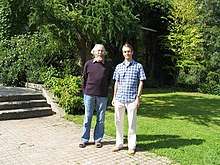Peter Aczel
Peter Henry George Aczel (/ˈæksəl/; born 31 October 1941) is a British mathematician, logician and Emeritus joint Professor in the Department of Computer Science and the School of Mathematics at the University of Manchester.[1] He is known for his work in non-well-founded set theory,[2] constructive set theory,[3][4] and Frege structures.[5][6]
Peter Aczel | |
|---|---|
 Peter Aczel (left) with Michael Rathjen, Oberwolfach 2004 | |
| Born | Peter Henry George Aczel 31 October 1941 |
| Nationality | UK |
| Alma mater | University of Oxford |
| Known for | Aczel's anti-foundation axiom Reflexive sets |
| Scientific career | |
| Fields | Mathematical logic |
| Institutions | |
| Thesis | Mathematical Problems in Logic (1967) |
| Doctoral advisor | John Newsome Crossley |
| Website | www |
Education
Aczel completed his Bachelor of Arts in Mathematics in 1963[7] followed by a DPhil at the University of Oxford in 1966 under the supervision of John Crossley.[1][8]
Career and research
After two years of visiting positions at the University of Wisconsin–Madison and Rutgers University Aczel took a position at the University of Manchester. He has also held visiting positions at the University of Oslo, California Institute of Technology, Utrecht University, Stanford University and Indiana University Bloomington.[7] He was a visiting scholar at the Institute for Advanced Study in 2012.[9]
Aczel is on the editorial board of the Notre Dame Journal of Formal Logic[10] and the Cambridge Tracts in Theoretical Computer Science, having previously served on the editorial boards of the Journal of Symbolic Logic and the Annals of Pure and Applied Logic.[7][11]
References
- Peter Aczel at the Mathematics Genealogy Project
- Moss, Lawrence S. (February 20, 2018). Zalta, Edward N. (ed.). The Stanford Encyclopedia of Philosophy. Metaphysics Research Lab, Stanford University – via Stanford Encyclopedia of Philosophy.
- Aczel, P. (1977). "An Introduction to Inductive Definitions". Handbook of Mathematical Logic. Studies in Logic and the Foundations of Mathematics. 90. pp. 739–201. doi:10.1016/S0049-237X(08)71120-0. ISBN 9780444863881.
- Aczel, P.; Mendler, N. (1989). "A final coalgebra theorem". Category Theory and Computer Science. Lecture Notes in Computer Science. 389. p. 357. doi:10.1007/BFb0018361. ISBN 3-540-51662-X.
- Aczel, P. (1980). "Frege Structures and the Notions of Proposition, Truth and Set". The Kleene Symposium. Studies in Logic and the Foundations of Mathematics. 101. pp. 31–32. doi:10.1016/S0049-237X(08)71252-7. ISBN 9780444853455.
- Peter Aczel at DBLP Bibliography Server

- "Peter Aczel page the University of Manchester".
- Aczel, Peter (1966). Mathematical problems in logic (DPhil thesis). University of Oxford.(subscription required)
- "Scholars". Institute for Advanced Study.
- Dame, Marketing Communications: Web | University of Notre. "Notre Dame Journal of Formal Logic". Notre Dame Journal of Formal Logic.
- "Annals of Pure and Applied Logic" – via www.journals.elsevier.com.
External link
![]()